Nihonbashi
 Wednesday, March 21, 2012 at 12:28PM
Wednesday, March 21, 2012 at 12:28PM
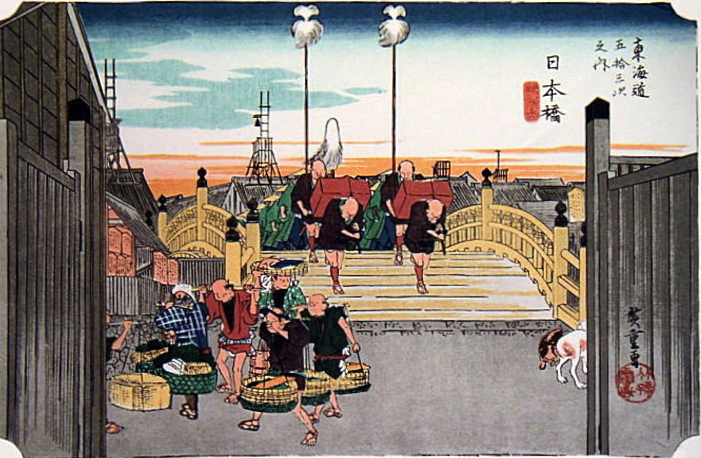 My last post reminds me of something I wrote in my second novel No.6:
My last post reminds me of something I wrote in my second novel No.6:
I can’t believe the two would take time out of their busy schedules just for this, and, yet, we spend the next hour or so prattling away like three buddies in a Starbucks. Mind you, I am not complaining--anything's better than sitting cross-legged on a sponge in that miserable, little cell--I just can't understand what all the urgency in putting me behind bars was when the "interrogations" would end up being so pedestrian.
With his head against the wall, Ozawa asks if I find Fukuoka a livable place.
I confess! I did it! I did it!
"Everyone's always asking me that," I reply with a sigh, "and I never quite know how to answer."
"It's a simple question," he says.
"It is, yes, but I often get the impression that people really don't want to know what I feel about the place. Rather, they're just prodding me into telling them what a wonderful city Fukuoka is. Is Fukuoka a good city? Yes, quite. It's clean, and by clean I don't mean beautiful because like most Japanese cities it isn't. Frankly speaking, it's ugly, but it is clean."
"I never noticed," Ozawa says.
Sadly, the drug enforcement agent is telling the truth.
In Tokyo, there's a famous bridge, called the Nihonbashi (lit. Japan Bridge) that crosses a river of the same name.
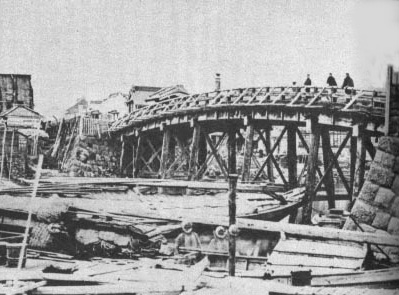 The original wooden Nihonbashi, which features prominently in ukiyo-e prints was constructed in 1603. The stone bridge spanning the river today was built in 1911 and is representative of the architecture of the Meiji Era, which was heavily influenced by British design.
The original wooden Nihonbashi, which features prominently in ukiyo-e prints was constructed in 1603. The stone bridge spanning the river today was built in 1911 and is representative of the architecture of the Meiji Era, which was heavily influenced by British design.
A popular sightseeing spot for Japanese today, many Japanese visiting the capital from the provinces have their picture taken at the bridge, which is considered the center of Tôkyô, and the point of reference used when measuring the distance from the city.
Until the 1960s, Mt. Fuji was still visible from the bridge. Any view you might want to enjoy today, however, has been blighted by an expressway that passes overhead.
I brought the eyesore to the attention of a middle-aged woman who was showing me some snapshots from a recent trip to Tokyo.
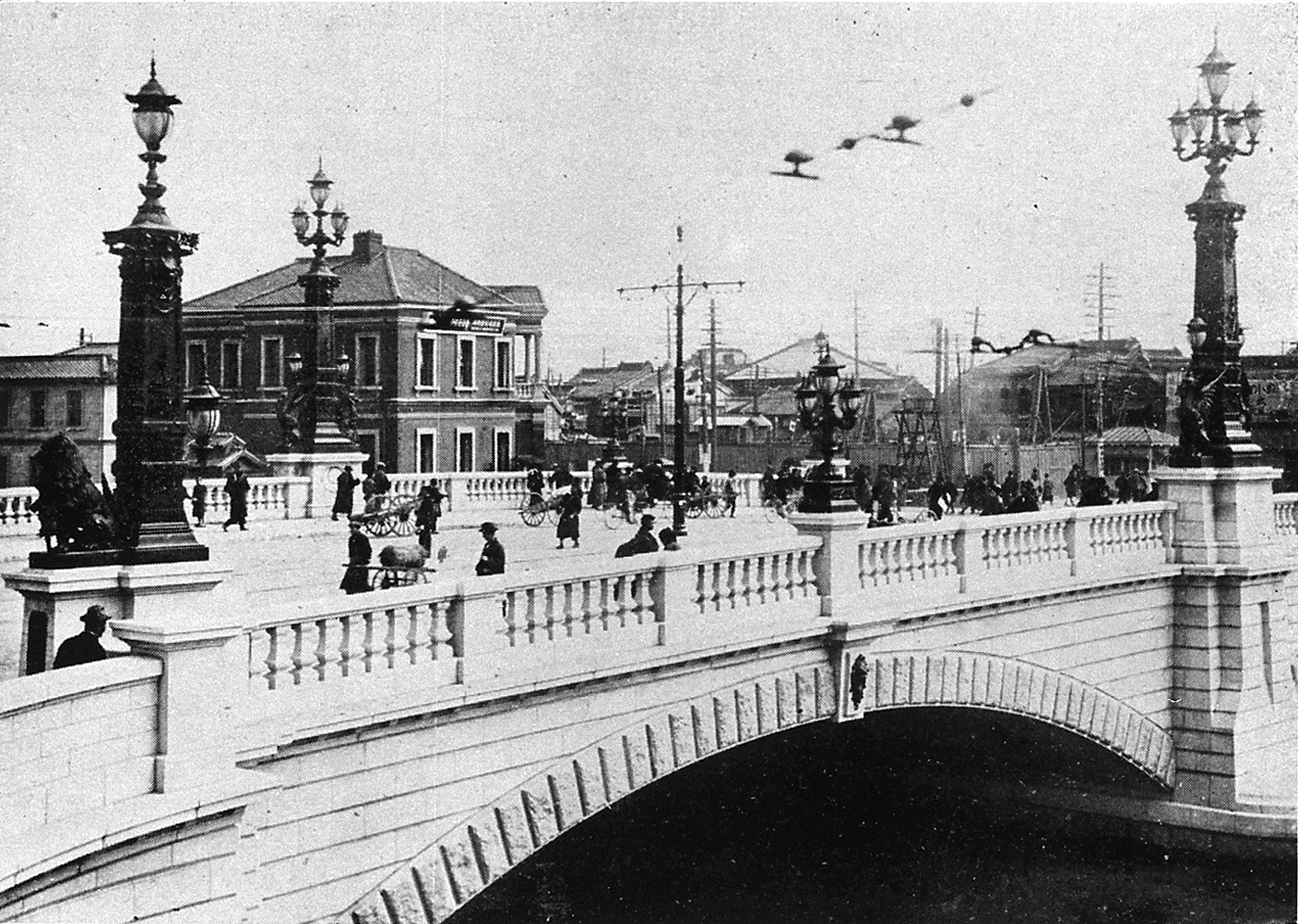 "This would have been a beautiful view,” I said, “if the Ministry in charge of roads hadn't ruined it by constructing this ugly highway."
"This would have been a beautiful view,” I said, “if the Ministry in charge of roads hadn't ruined it by constructing this ugly highway."
She was surprised to hear that. Focused so intently on the bridge itself, lost in myopic nostalgia, she hadn't even given a thought to the highway and the noisy traffic roaring ahead.
But that's the way it is with the Japanese. They can find a dandelion in a dunghill and consider its beauty worthy of a haiku. The unthinking acceptance of concrete as progress has allowed the government to pave over the country creating a monster of modernity.
And Japanese will tell you that they haven’t noticed.
A city like Fukuoka is only moderately better. Without any semblance of an overall plan, though, it has become an architectural free-for-all, left to the capricious collusion of greedy property developers, landowners, and unthinking bureaucrats.
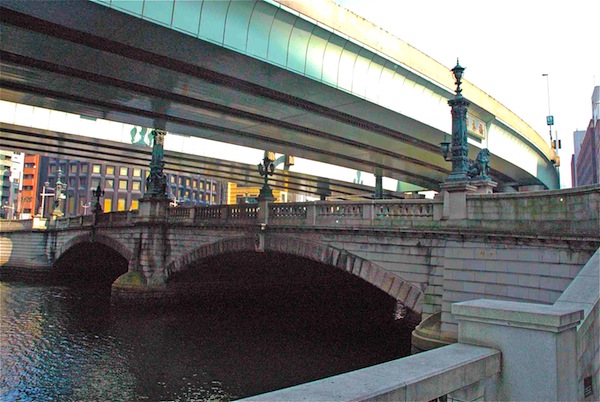 But, yes, Fukuoka is clean. I'll hand it that. There's no litter in the streets, hardly any graffiti on the walls. The Japanese tend to respect public property, other people's property, which is something American and European youth might consider emulating before they spray, scratch, or scrawl their name on a wall like a mongrel marking it's territory with piss.
But, yes, Fukuoka is clean. I'll hand it that. There's no litter in the streets, hardly any graffiti on the walls. The Japanese tend to respect public property, other people's property, which is something American and European youth might consider emulating before they spray, scratch, or scrawl their name on a wall like a mongrel marking it's territory with piss.
"The food is good, too," I say. "You can duck under the noren curtain of just about any restaurant in my neighborhood of Daimyô and be fairly certain of getting a reasonably priced meal that will knock your socks off."
"Got that right," Ozawa says, closing his eyes and imagining, I suspect, a big bowl of Hakata tonkotsu (pork bone) ramen.
"Now, Ozawa-san, if you're asking me whether it's easy for a foreigner to live in this town, then you're asking the wrong guy."
"Why's that?"
"Because I've been out of place my whole life. I don't know what it's like to feel at home."
"Oh?" he says, straightening up.
"Ever since I was a kid," I tell him, "I've been going back to my father's hometown of Avignon, near the south of France. I speak the language all right, not perfect of course, but I manage, and have a French name. You'd think I'd be able to kick back and enjoy myself there. The local French, though, they take one look at my face and see an Arab. If I tell them, that I'm not Arab, that I'm half Lebanese, the tension eases up a bit, but not a whole lot. They don't consider me half-French, they see me as being Lebanese. And, well, if you're half French, you're half of nothing and half of nothing is nothing, after all."
"Remarkable," says Nakata, leaning forward and propping his pudgy mug up in the palm of his left hand. "I had no idea it was like that there."
"In America it's not much different. Even though I was born there and spent most of my life there. I've never managed to fit in."
"Why not?" Ozawa asks.
"Beats me! America's supposed to be a country of immigrants, people coming from every corner on the earth, many only two or three generations earlier. You'd think that with all that rich culture pouring into the U.S., the country would have this sumptuous cultural heritage and celebrate their roots more. Your average American, however, couldn't care less about what is happening outside the country. The ignorance is pervasive and entrenched."
To read the first installment of No.6, please go here.
To read the remainder of No.6, please visit here.
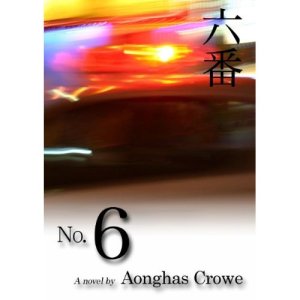 © Aonghas Crowe, 2010. All rights reserved. No unauthorized duplication of any kind.
© Aonghas Crowe, 2010. All rights reserved. No unauthorized duplication of any kind.
注意:この作品はフィクションです。登場人物、団体等、実在のモノとは一切関係ありません。
All characters appearing in this work are fictitious. Any resemblance to real persons, living or dead, is purely coincidental.
No. 6 is now available on Kindle.
Reader Comments